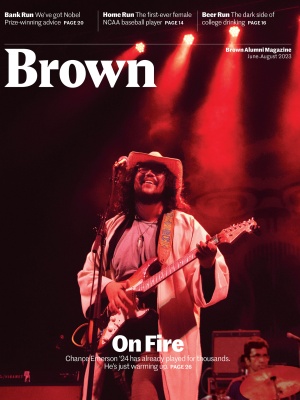Since arriving in the U.S. from her native Austria, Amélie-Sophie Vavrovsky ’18 has dealt with the anxiety of navigating the American immigration bureaucracy and applying for visas.
“I think I was just puzzled how difficult it is for a normal person to access any kind of legal help,” she says. “It’s a huge black box.”
Participating in Hack@Brown her senior year, with 48 hours to produce an innovative concept, Vavrovsky recalled her frustration with the immigration system and suggested her team develop an online platform to assist refugees in seamlessly filling out paperwork and applying for asylum.
The team won best real world application for the concept and, sensing they were on to something, successfully applied for the University’s start-up summer accelerator program, Breakthrough Lab. The idea won first place—$25,000—in the Nelson Center's 2019 Brown Venture Prize competition, and a few years later, has matured into Formally, which helps immigrants apply for visas of all kinds and assists lawyers in managing their clients’ applications.
“What we’re really trying to change with Formally is the fact that for individuals, legal processes are really scary,” Vavrovsky says.
Recently named a Forbes 30 under 30 social impact maker, Vavrovsky acknowledges her own immigration story is a privileged one but recalls how hard it was to secure a visa to stay longer after graduating. After some research, she applied for an O-1 visa for “individuals with extraordinary ability or achievement,” allowing her to stay in the U.S.
Other prospective immigrants can rely on Formally, which walks people through the process, matching them with the right visa, managing the myriad legal forms and making it easier to share (and unshare) files with lawyers. The platform also pairs clients with lawyers and reduces the administrative tasks and paperwork.
Vavrovsky convinced a range of immigration legal teams, from sole practitioners to major firms, to sign up as beta users to test out Formally. Her own immigration lawyer was the first. She talks most days with him and the other legal teams to learn how to improve the platform.
“Not being a lawyer myself actually leads to better conversations with lawyers about how they actually work, because I don’t have any assumptions about their workflow,” says Vavrovsky, who studied international relations and Middle East studies at Brown. “I think it’s actually kind of liberating to have a beginner’s mindset.”
While just 2 percent of venture capital funding goes to women-led companies, Vavrovsky raised $2.3 million in May after meeting with Bessemer Capital investor Bob Goodman ’82.
She says she loves the challenge of studying new things. “I think being a founder is all about learning new things every single day and not being afraid to just dive in,” she says. “As somebody building a company, you’re going to do things all day long that you’ve never done before.”





